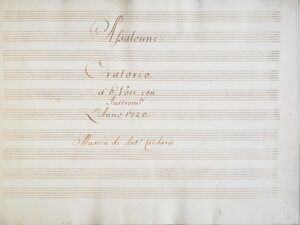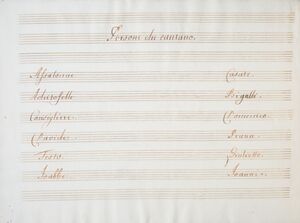Difference between revisions of "Assalonne"
| (17 intermediate revisions by the same user not shown) | |||
| Line 5: | Line 5: | ||
| type = | | type = | ||
| composer = [[Antonio Caldara]] | | composer = [[Antonio Caldara]] | ||
| image = <!-- free image only --> | | image = Cover assalonne.jpg | ||
<!-- free image only --> | |||
| image_size = | | image_size = | ||
| alt = | | alt = First page of Assalonne | ||
| border = <!-- Set to yes for a border --> | | border = <!-- Set to yes for a border --> | ||
| caption = | | caption = First page of ''Assalonne'', 1720<ref name="IMSLP"/> | ||
| translation = | | translation = | ||
| native_name = | | native_name = | ||
| Line 30: | Line 31: | ||
| written = <!-- {{Timeline-event|date={{Start date|YYYY|MM|DD|df=y}}|end_date={{End date|YYYY|MM|DD|df=y}} --> | | written = <!-- {{Timeline-event|date={{Start date|YYYY|MM|DD|df=y}}|end_date={{End date|YYYY|MM|DD|df=y}} --> | ||
| text = | | text = | ||
| libretto = Giacomo Antonio Bergamori | | libretto = [[Giacomo Antonio Bergamori]] | ||
| language = | | language = | ||
| based_on = | | based_on = | ||
| Line 56: | Line 57: | ||
}} | }} | ||
'''{{lang|it|Assalonne}}''' (Engl.: Absalom, Ger: Abschalom or Absalom) is an oratorio by [[Antonio Caldara]] with a libretto by [[Giacomo Antonio Bergamori]]. It premiered in 1720, at the {{ | '''{{lang|it|Assalonne}}''' (Engl.: Absalom, Ger: Abschalom or Absalom) is an oratorio by [[Antonio Caldara]] with a libretto by [[Giacomo Antonio Bergamori]]. It premiered in 1720, at the {{lang|de|Hofkapelle}} (court chapel) in Vienna<ref name="IMSLP"/>. An alternate spelling is "Assalone", as used by Stanford University<ref name="OpeningNight"/> | ||
==Synopsis== | ==Synopsis== | ||
''Assalonne'' tells the biblical story of Absalom who leads an uprising against his father, David. He is killed for his treason | ''Assalonne'' tells the biblical story of Absalom who leads an uprising against his father, David. He is killed for his treason. His father is still devastated about his death, not being able to find any joy in the notion that the riot has been stopped - and his son is dead. One player in stopping, arresting and finally killing Absalom is ''Ioabbe/Joabbe'' (Joab), a captain of David's army. (2 Samuel 18:1-33)<ref name="Bible"/> | ||
==Roles and premiere cast== | ==Roles and premiere cast== | ||
[[File:Assalonne cast sheet.jpg|thumb|400|alt=Cast sheet from the manuscript, 1720|Cast sheet from the manuscript, 1720<ref name="IMSLP"/>]] | |||
{| class="wikitable" style="zebra" | {| class="wikitable" style="zebra" | ||
! Role | ! Role | ||
! Voice type | ! Voice type | ||
! | ! Roles as indicated in the Manuscript. These might differ from the premiere cast! | ||
|- | |- | ||
| Assalonne (Absalom) | | Assalonne (Absalom) | ||
| Line 73: | Line 75: | ||
| Achitofelle (Achitophel) | | Achitofelle (Achitophel) | ||
| | | | ||
| | | Brigatti (Brigalli?) maybe Borosini (p. 125)<ref name="Caldara"/> | ||
|- | |- | ||
| Consigliere | | Consigliere | ||
| Line 82: | Line 84: | ||
| | | | ||
| Praun | | Praun | ||
|- | |||
| Testo | |||
| | |||
| Giulio<ref name="Caldara"/>/ Giulietto <ref name="IMSLP"/> | |||
|- | |||
| Joabbe | |||
| | |||
| Joanni (Caldara, p.125)<ref name="Caldara"/> | |||
|} | |} | ||
<ref name="IMSLP"/><ref name="Caldara"/> | <ref name="IMSLP"/><ref name="Caldara"/> | ||
| Line 89: | Line 99: | ||
==Sources== | ==Sources== | ||
Free Score at the IMSLP: | *Free Score at the IMSLP: | ||
:Manuscript, n.d.(ca.1720). | |||
:Copyist of Vienna | :Copyist of Vienna | ||
:Public Domain | :Public Domain | ||
| Line 132: | Line 142: | ||
! Album | ! Album | ||
|- | |- | ||
| | | [[2020]] | ||
| | | [[La Vanità del Mondo (Album)]] | ||
|} | |} | ||
<!-- | |||
===Compilations=== | ===Compilations=== | ||
{| class="wikitable sortable" style="zebra | {| class="wikitable sortable" style="zebra | ||
| Line 161: | Line 172: | ||
| | | | ||
|} | |} | ||
--> | |||
===Complete list of musical numbers from '' | ===Complete list of musical numbers from ''Assalonne''=== | ||
This listing only contains the musical pieces performed and/or recorded by Philippe Jaroussky. | This listing only contains the musical pieces performed and/or recorded by Philippe Jaroussky. | ||
{| class="wikitable sortable" style="zebra" | {| class="wikitable sortable" style="zebra" | ||
| Line 170: | Line 181: | ||
! Year first published/performed | ! Year first published/performed | ||
|- | |- | ||
| | | [[2020]] | ||
| | | "[[Contro l'empio s'impugni la spada]]" | ||
| | | [[La Vanità del Mondo (Album)]] | ||
| | | 1720 | ||
|} | |} | ||
| Line 202: | Line 213: | ||
|website=OpeningNight | |website=OpeningNight | ||
|publisher=Stanford | |publisher=Stanford | ||
|access-date={{date|2021-10-22|MDY}} | |||
|archive-date={{date|2021-10-22|MDY}} | |||
|quote=}}</ref> | |||
<ref name="Bible"> | |||
{{cite web | |||
|url=https://en.wikipedia.org/wiki/Joab | |||
|archive-url=https://archive.ph/ikv9N | |||
|title=Joab | |||
|last= | |||
|first= | |||
|date= | |||
|website=Wikipedia | |||
|publisher= | |||
|access-date={{date|2021-10-22|MDY}} | |access-date={{date|2021-10-22|MDY}} | ||
|archive-date={{date|2021-10-22|MDY}} | |archive-date={{date|2021-10-22|MDY}} | ||
Latest revision as of 11:47, 25 October 2021
| Assalonne | |
|---|---|
| by Antonio Caldara | |
 First page of Assalonne, 1720[1] | |
| English | Absalom |
| Other name | Assalone[2] |
| Libretto | Giacomo Antonio Bergamori |
| Premiere | |
| Date | 23 February 1720[1][2] |
| Location | Vienna: Hofkapelle |
Assalonne (Engl.: Absalom, Ger: Abschalom or Absalom) is an oratorio by Antonio Caldara with a libretto by Giacomo Antonio Bergamori. It premiered in 1720, at the Hofkapelle (court chapel) in Vienna[1]. An alternate spelling is "Assalone", as used by Stanford University[2]
Synopsis
Assalonne tells the biblical story of Absalom who leads an uprising against his father, David. He is killed for his treason. His father is still devastated about his death, not being able to find any joy in the notion that the riot has been stopped - and his son is dead. One player in stopping, arresting and finally killing Absalom is Ioabbe/Joabbe (Joab), a captain of David's army. (2 Samuel 18:1-33)[3]
Roles and premiere cast

| Role | Voice type | Roles as indicated in the Manuscript. These might differ from the premiere cast! |
|---|---|---|
| Assalonne (Absalom) | Casati | |
| Achitofelle (Achitophel) | Brigatti (Brigalli?) maybe Borosini (p. 125)[4] | |
| Consigliere | Domenico | |
| Davide | Praun | |
| Testo | Giulio[4]/ Giulietto [1] | |
| Joabbe | Joanni (Caldara, p.125)[4] |
Sources
- Free Score at the IMSLP:
- Manuscript, n.d.(ca.1720).
- Copyist of Vienna
- Public Domain
- Österreichische Nationalbibliothek, Vienna (A-Wn): Mus.Hs.17058
- "Assalonne (Caldara, Antonio)". IMSLP. Österreichische Nationalbibliothek, Vienna. 1720. Retrieved October 21, 2021.[1]
- Free Libretto
- Assalonne / Oratorio / Cantato / Nell'Augustissima Capella
- Della Sac. Cesarea, e Catt. Real / Maesta' / di / Carlo VI.
- Imperador / de' Romani / Sempre Augusto / L'Anno M. DCC.XX
- Musica del Sig. Antonio Caldara, Vice-Maestro di Cappella di S. M. Ces. e Catt.
- Vienna d'Austria / Appresso Gio. Van Ghelen, Stampatore d Corte di S. M. C. e C.
- Caldara, Antonio (1720). "Assalone". Google Books. Gio. Van Ghelen, Stampatore d Corte di S. M. C. e C. Archived from the original on October 22, 2021. Retrieved October 22, 2021.[5]
Assalonne in Philippe Jaroussky's discography, filmography and performance history
Solo Albums/Recital albums
| Year | Album |
|---|---|
| 2020 | La Vanità del Mondo (Album) |
Complete list of musical numbers from Assalonne
This listing only contains the musical pieces performed and/or recorded by Philippe Jaroussky.
| Year published or performed | title | Album, Video or Concert Program | Year first published/performed |
|---|---|---|---|
| 2020 | "Contro l'empio s'impugni la spada" | La Vanità del Mondo (Album) | 1720 |
References
- ↑ 1.0 1.1 1.2 1.3 1.4 1.5 1.6 "Assalonne (Caldara, Antonio)". IMSLP. Österreichische Nationalbibliothek, Vienna. 1720. Retrieved October 1, 2021.
- ↑ 2.0 2.1 2.2 Caldara, Antonio. "Assalone". OpeningNight. Stanford. Archived from the original on October 22, 2021. Retrieved October 22, 2021.
- ↑ "Joab". Wikipedia. Archived from the original on October 22, 2021. Retrieved October 22, 2021.
- ↑ 4.0 4.1 4.2 4.3 Kirkendale, Ursula (1966). Antonio Caldara, Sein Leben und seine venezianisch-römischen Oratorien. Böhlau, Universität Wien. Musikwissenschaftliches Institut.
- ↑ Caldara, Antonio (1720). "Assalone". Google Books. Gio. Van Ghelen, Stampatore d Corte di S. M. C. e C. Archived from the original on October 22, 2021. Retrieved October 22, 2021.